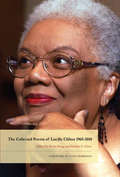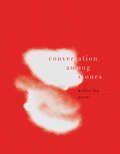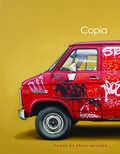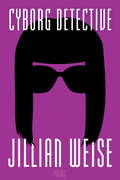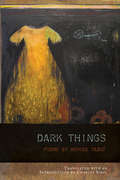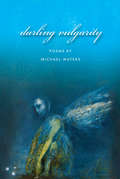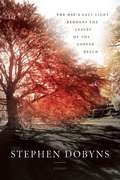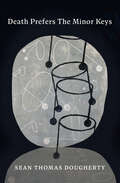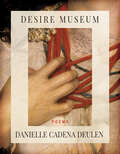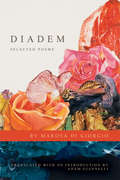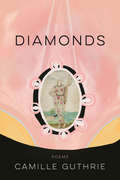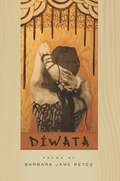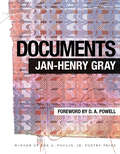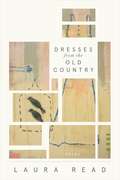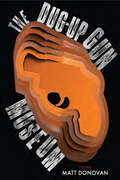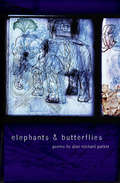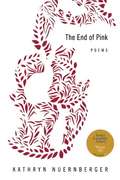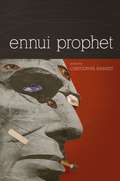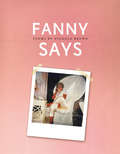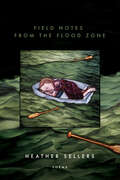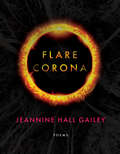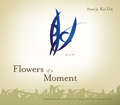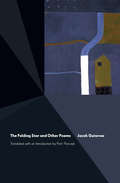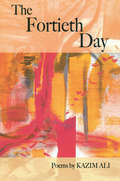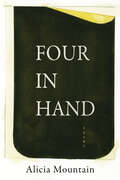- Table View
- List View
The Collected Poems of Lucille Clifton 1965-2010 (American Poets Continuum)
by Lucille CliftonThe Collected Poems of Lucille Clifton 1965-2010 combines all eleven of Lucille Clifton's published collections with more than fifty previously unpublished poems. The unpublished poems feature early poems from 1965-1969, a collection-in-progress titled the book of days (2008), and a poignant selection of final poems. An insightful foreword by Nobel Prize-winning author Toni Morrison and comprehensive afterword by noted poet Kevin Young frames Clifton's lifetime body of work, providing the definitive statement about this major America poet's career. <p><p> On February 13, 2010, the poetry world lost one of its most distinguished members with the passing of Lucille Clifton. In the last year of her life, she was named the first African American woman to receive the $100,000 Ruth Lilly Poetry Prize honoring a US poet whose "lifetime accomplishments warrant extraordinary recognition," and was posthumously awarded the Robert Frost Medal for lifetime achievement from the Poetry Society of America.
Conversation Among Stones
by Willie LinAwakening to histories personal and social, Conversation Among Stones is a meditation on memory and identity. Through fields of wild grass, restless seascapes, and cities tinged with sand, Willie Lin's debut collection of poetry questions what can remain and what must be pared away in our search for truth. Conversation Among Stones speaks both to the inanimate—misremembered histories, photographs, the dead—and to the voices in our daily lives that reverberate with disagreement and confusion. Punctuated by doubt and resistant to easy transformations, these poems listen and revise. With striking restraint and simultaneous abundance, these poems attempt to reconcile the desire for answers with the necessity of not knowing.Turn by turn, this collection catalogs moments of approach, fervor, and strife and carries us into a profound quest for understanding: “And that was one conviction: / that we must be to one another / what the world is not / to us.”
Copia
by Erika Meitner"The poems in Copia are about what is and what is almost-gone, what is in limbo and what won't give way, what is almost at rock bottom but still and always brimming with the possibility of miracle."—Rachel ZuckerErika Meitner's fourth book takes cues from the Land Artists of the 1960s who created work based on landscapes of urban peripheries and structures in various states of disintegration. The collection also includes a section of documentary poems about Detroit that were commissioned for Virginia Quarterly Review.Because it is an uninhabited place, because itmakes me hollow, I pried open the pages ofDetroit: the houses blanked out, factoriesabsorbed back into ghetto palms and scrub-oak, piles of tires, heaps of cement block.Vines knock and enter through shattereddrop-ceilings, glassless windows. Ragwortcracks the street's asphalt to unsolvablepuzzles.Meitner also probes the hulking ruins of office buildings, tract housing, superstores, construction sites, and freeways, and doesn't shy from the interactions that occur in Walmart and supermarket parking lots.It is nearly Halloween, which meanswrong sizes on Wal-Mart racks, variety bags ofpumpkins extinguishing themselves on the stoopchildren from the trailer park trawling our identical lawns soonso we can give away nickels, light, sandpaper, raisins, cement.Erika Meitner was a 2009 National Poetry Series winner. Her work has appeared in American Poetry Review, Ploughshares, Tin House, The Best American Poetry 2011, Kenyon Review, and elsewhere. She is associate professor of English at Virginia Tech.
Cyborg Detective (American Poets Continuum #174)
by Jillian WeiseIn her third collection of poems, Jillian Weise delivers a reckoning to the ableism of the Western Canon. These poems investigate and challenge the ways that nondisabled writers have appropriated disabled bodies, from calling out William Carlos Williams to biohacking Raymond Carver’s “Cathedral” to chronicling the ongoing headlines of violence against disabled women. Part invective, part love poem, Cyborg Detective holds a magnifying glass to the marginalization and fetishization of disabled people while claiming space and pride for the people who already use technology and cybernetic implants every day.
Dark Things (Lannan Translations Selection Series)
by Novica TadicNovica Tadic is Serbia&’s leading poet and the linguistic heir to Vasko Popa. With this translation, US Poet Laureate and Pulitzer Prize–winner Charles Simic brings the full range of Tadic&’s dark beauty to light:I dream how on a flat surfaceI set down knives of various shapes and sizes.Already there are so many of themI can&’t count them,or see them all. Someone&’s being done inby those knives.Novica Tadic has won most major Serbian literary awards, including the prestigious Laureat Nagrade. Charles Simic&’s latest poetry collection is That Little Something (Harcourt, 2008).
Darling Vulgarity (American Poets Continuum)
by Michael WatersWith both ardor and sensuality, Darling Vulgarity challenges us to embrace humanity&’s imperfections while urging us toward new spiritual realities. And then, sometimes, the poems are just plain sexy. Or, as Nat Hardy wrote, &“Waters&’ meditative and confessional forays into the sexual sublime are both disturbing and artfully passionate.&”Darling Vulgarity also includes poems based on Waters&’ true literary experiences with such notables as Raymond Carver, Allen Ginsberg, and Robert Lowell.
The Day's Last Light Reddens the Leaves of the Copper Beech
by Stephen DobynsThis new collection from best-selling poet and novelist Stephen Dobyns focuses on the hard, ephemeral truth of mortality, and includes the section "Sixteen Sonnets for Isabel" about the recent death of his wife. In true Dobyns fashion, these poems grip and guide readers into a state of empathy, raising the question of how one lives and endures in the world.
Death Prefers the Minor Keys
by Sean Thomas DoughertyIn his twentieth book, most of which was first composed on the backs of medical forms while on break as a third-shift medical technician, Sean Thomas Dougherty brings us a memoir-like prose sequence reflecting on disability, chronic illness, addiction, survival, love, and parenthood. In Death Prefers the Minor Keys, Dougherty offers the reader collaged prose poems, stories and essays full of dreams, metaphors, aphorisms, parables and narratives of his work as a caregiver. Moving portraits of Dougherty’s residents, a series of letters to Death, invocations of Jewish ancestry through the photography of Roman Vishniac, imaginary treatments for brain injuries, and half translated short stories of lives both real and imagined populate this collection. Through these, Dougherty engages issues of labor, the ontology of disability, and the mysticism of life. Death Prefers the Minor Keys is most of all a kind of love letter to Dougherty’s wife, and her courage and complicity in the face of long-term illness and addiction. Ultimately, we see how the antidote to despair can reside in daily acts of caring for other human beings.
Desire Museum
by Danielle Cadena DeulenConsumed with the accumulation of lost time and unfulfilled longing, Desire Museum by Danielle Cadena Deulen is an intricate exploration of things left unfinished or unsatisfied. Divided into four sections and shaped by female-identified embodiment, Desire Museum touches on lost love and friendship, climate crisis, lesbian relationships, and the imprisonment of children at the U.S.-Mexico border. These poems trace the pleasures and pitfalls of sex, the anxieties of motherhood, and the ramifications of interpersonal, sociopolitical, and environmental trauma in women’s lives. In these pages, Deulen holds up a candle to desire itself, questioning what it means to recognize and embrace one's desires, or what it might mean to let them go.In conversation with Hopkins, Keats, Crane, and Lorca, Deulen seamlessly weaves memories into dreamscapes and blurs the human and natural worlds. With love, wonder, grief, and awe, Desire Museum shows us that to live alongside desire is to refuse to be contained: “I refuse meaning [ ] the first sunrise reiterates the last.”
Diadem: Selected Poems (Lannan Translations Selection Series)
by Marosa Di GiorgioMarosa di Giorgio has one of the most distinct and recognizable voices in Latin American poetry. Her surreal and fable-like prose poems invite comparison to Franz Kafka, Julio Cortázar, or even contemporary American poets Russell Edson and Charles Simic. But di Giorgio's voice, imagery, and themes—childhood, the Uruguayan countryside, a perception of the sacred—are her own. Previously written off as "the mad woman of Uruguayan letters," di Giorgio's reputation has blossomed in recent years. Translator Adam Giannelli's careful selection of poems spans the enormous output of di Giorgio's career to help further introduce English-language readers to this vibrant and original voice. Marosa di Giorgio was born in Salto, Uruguay, in 1932. Her first book Poemas was published in 1953. Also a theater actress, she moved to Montevideo in 1978, where she lived until her death in 2004.
Diamonds (American Poets Continuum Series #189)
by Camille GuthrieDiamonds presents a woman in midlife on the edge. In hilarious and heartbreaking poems, Camille Guthrie writes about the trials and surprises of divorce, parenting, country life—and the difficulties and delights of being alone, looking at art, and falling in love. Witty resilience abounds in these irreverent poems about grief and desire—in which the poet meditates upon gender roles, history, pop culture, and academia. Guthrie subverts and teases traditional forms in an elegy about Sylvia Plath’s prom dress, a dating profile for Hieronymus Bosch, a sestina about beauty and power—with radical dramatic monologues in the voices of Madame du Barry, a Pict Woman, and more. Unlike Virgil, who refuses to guide this poet through her journey at midlife, Guthrie leads readers by the hand into a provoking, affecting journey of a break-up and a reconciliation with love.
Diwata (American Poets Continuum #123)
by Barbara Jane ReyesTagalog is a language spoken by twenty-two million people in the Philippines. Diwata is a Tagalog term meaning "muse." Diwata is also a term for a mythical being who resides in nature, and who human communities must acknowledge, respect, and appease in order to live harmoniously in this world.In her book Diwata, Barbara Jane Reyes frames her poems between the Book of Genesis creation story and the Tagalog creation myth, placing her work somewhere culturally between both traditions. Also setting the tone for her poems is the death and large shadow cast by her grandfather, a World War II veteran and Bataan Death March survivor, who has passed onto her the responsibility of remembering. Reyes' voice is grounded in her community's traditions and histories, despite war and geographical dislocation.From "Estuary 2":She was born with fins and fishtail,A quick blade slicing water.She was her father's mermaid child,A river demon, elders said.She mimicked her cetaceous brothers,Abalone diving bluest depths.She polished smooth her brothers' masks,Inlaid nacre half moon eyes.She lit oak pyres and bade the windA whispered requiem.Barbara Jane Reyes is author of two previous poetry collections including Poeta en San Francisco, which was awarded the 2005 James Laughlin Award from the Academy of American Poets. She was born in Manila and raised in the San Francisco Bay Area. She works as adjunct professor in Philippine studies at the University of San Francisco.From National Book Critics Circle:"Diwata as a mythological invocation takes teh reader back to pre-colonial Philippines when the belief in these god and goddesses shaped the everyday lives on the Southeast Asian archipelago. They have now become your muses as you reach toward this cultural legacy to shape a distinct postmodern poetics in which yo u don’t simply erase colonial history- you build with that narrative as well."
Documents (New Poets of America #42)
by Jan-Henry GrayRooted in the experience of living in America as a queer undocumented Filipino, Documents maps the byzantine journey toward citizenship through legal records and fragmented recollections. In poems that repurpose the forms and procedures central to an immigrant’s experiences—birth certificates, identification cards, letters, and interviews—Jan-Henry Gray reveals the narrative limits of legal documentation while simultaneously embracing the intersections of identity, desire, heritage, love, and a new imagining of freedom.
Dresses from the Old Country (American Poets Continuum #168)
by Laura ReadIn Laura Read’s second poetry collection, the former poet laureate of Spokane, WA, weaves past and present together to create a portrait of a life in progress. As the speaker looks back on her life, she exists simultaneously as all the selves she has ever been: a lost child, a lonely adolescent, a teacher, a daughter, a friend, a wife, a mother—a woman continually shaped and reshaped by memory and experience. Deeply rooted in a particular time and place, Read’s poems strip away the illusion of the passage of time as they reveal how we are all wearing “dresses from the old country.”
The Dug-Up Gun Museum (American Poets Continuum Series #197)
by Matt DonovanTraveling the nation, Matt Donovan examines the paradox of a country plagued by gun violence yet consumed with protecting the right to bear arms.Matt Donovan’s The Dug-Up Gun Museum confronts our country’s obsession with guns to explore America’s deep-seated political divisions and issues linked to violence, race, power, and privilege. Taking its title from an actual museum located in Wyoming, this collection of poems interrogates our country’s history of gun violence, asking questions about our fetishization of weapons, how mass shootings and the killing of unarmed civilians by police have become normalized, and the multitudinous ways in which firearms are ingrained in our country’s culture. Much like the poet himself, Donovan’s poems are dynamic and constantly in motion as he explores the ways in which capitalism and its relentless stream of content have led to a collective desensitization in the face of violence. In turns harrowing, elegiac, and ironic, set in locations ranging from Cody to Chicago, from Las Vegas to Sandy Hook, The Dug-Up Gun Museum probes America’s failures, bizarre infatuations, and innumerable tragedies linked to guns.
Elephants & Butterflies (American Poets Continuum #111)
by Alan Michael ParkerElephants & Butterflies combines the imaginative forays of The Vandals with the more meditative approach of Love Song with Motor Vehicles. Both wild and calm, boisterous and quiet, the poems in Elephants & Butterflies use surprise, song, and startling metaphor while allowing the ideas to simmer just below the surface of the lyric. The poems manage the difficult task of being highly readable and accessible, while still containing complex philosophical and personal knowledge.Alan Michael Parker (www.amparker.com) teaches at Davidson College in Davidson, North Carolina. He also teaches at Queens University, where he is core faculty in the low-residency MFA program.
The End of Pink (American Poets Continuum)
by Kathryn NuernbergerWinner of the 2015 James Laughlin Award, Kathryn Nuernberger's The End of Pink is populated by strange characters—Bat Boy, automatons, taxidermied mermaids, snake oil salesmen, and Benjamin Franklin—all from the annals of science and pseudoscience. Equal parts fact and folklore, these poems look to the marvelous and the weird for a way to understand childbirth, parenthood, sickness, death, and-of course—joy.
Ennui Prophet (American Poets Continuum #127)
by Christopher Kennedy"Singular and deeply pleasurable. Christopher Kennedy's prosetry is a lonely anarchic nation-state unto itself, half vacation funspot, half eerie purgatorial layover."-Dave EggersThe poems in Ennui Prophet, Christopher Kennedy's fourth collection, range from deeply personal explorations of relationships with family and friends, to examinations of the political climate in the first decade of the millennium. Whether personal or public, Kennedy gazes through a slightly distorted lens to better see the world around us.Christopher Kennedy's previous book, Encouragement for a Man Falling to His Death (BOA Editions Ltd., 2007) received the Isabella Gardner Poetry Award. He directs Syracuse University's MFA program in creative writing.
Fanny Says
by Nickole BrownAn “unleashed love song” to her late grandmother, Nickole Brown’s collection brings her brassy, bawdy, tough-as-new-rope grandmother to life. With hair teased to Jesus, mile-long false eyelashes, and a white Cadillac Eldorado with atomic-red leather seats, Fanny is not your typical granny rocking in a chair. Instead, think of a character that looks a lot like Eva Gabor in Green Acres, but darkened with a shadow of Flannery O’Connor. A cross-genre collection that reads like a novel, this book is both a collection of oral history and a lyrical and moving biography that wrestles with the complexities of the South, including poverty, racism, and domestic violence."Nickole Brown’s unleashed love song to her grandmother is raucous and heart-rending, reflective and slap-yo-damn-knee hilarious, a heady meld of lyrical line and life lesson. Brown is blessed to be blood-linked to such a shrewd and singular soul, and the poet's mix of monologue, myth, and unbridled mayhem paints a picture of a proper Southern lady who is just—well, unforgettable." —Patricia Smith"In Fanny Says, Nickole Brown distills the whole of America into one woman: bawdy, loving, racist, battered, healed, and gorgeous with determination. Our country has no history that does not touch the South. Our divisions are our unions. Here, Brown unleashes a voice returned to teach us a lesson. Reader, fair warning: you can’t hide from Fanny. You will be changed by this book." —Rebecca Gayle Howell
Field Notes from the Flood Zone (American Poets Continuum Series #192)
by Heather SellersFrom the frontlines of climate catastrophe, a poet watches the sea approach her doorstep. Born and raised in Florida, Heather Sellers grew up in an extraordinarily difficult home. The natural world provided a life-giving respite from domestic violence. She found, in the tropical flora and fauna, great beauty and meaningful connection. She made her way by trying to learn the name of every flower, every insect, every fish and shell and tree she encountered. That world no longer exists. In this collection of poems, Sellers laments its loss, while observing, over the course of a year, daily life of the people and other animals around her, on her street, and in her low-lying coastal town, where new high rises soar into the sky as the storm clouds gather with increasing intensity and the future of the community—and seemingly life as we know it—becomes more and more uncertain. Sprung from her daily observation journals, haunted by ghosts from the past, Field Notes from the Flood Zone is a double love letter: to a beautiful and fragile landscape, and to the vulnerable young girl who grew up in that world. It is an elegy for the two great shaping forces in a life, heartbreaking family struggle and a collective lost treasure, our stunning, singular, desecrated Florida, and all its remnant beauty.
Flare, Corona (American Poets Continuum Series #201)
by Jeannine Hall GaileyAgainst a constellation of solar weather events and evolving pandemic, Jeannine Hall Gailey’s Flare, Corona paints a self-portrait of the layered ways that we prevail and persevere through illness and natural disaster.Gailey deftly juxtaposes odd solar and weather events with the medical disasters occurring inside her own brain and body— we follow her through a false-alarm terminal cancer diagnosis, a real diagnosis of MS, and finally the onset of the coronavirus pandemic. The solar flare and corona of an eclipse becomes the neural lesions in her own personal “flare,” which she probes with both honesty and humor. While the collection features harbingers of calamity, visitations of wolves, blood moons, apocalypses, and plagues, at the center of it all are the poet’s attempts to navigate a fraught medical system, dealing with a series of challenging medical revelations, some of which are mirages and others that are all too real. In Flare, Corona, Jeannine Hall Gailey is incandescent and tender-hearted, gracefully insistent on teaching us all of the ways that we can live, all of the ways in which we can refuse to do anything but to brilliantly and stubbornly survive.
Flowers of a Moment (Lannan Translations Selection Series)
by Ko Un&“Bodhisattva of Korean poetry, exuberant, demotic, abundant, obsessed with poetic creation . . . Ko Un is a magnificent poet, combination of Buddhist cognoscente, passionate political libertarian, and naturalist historian.&”—Allen Ginsberg"Korea's greatest living Zen poet."—Lawrence Ferlinghetti Flowers of a Moment is a treasure trove of more than 180 brief poems by a major world poet at the apex of his career. A four-time Nobel Prize nominee,Ko Un grew up in Korea during the Japanese occupation. During the Korean War, he was conscripted by the People's Army. In 1952, he became a Buddhist and lived a monastic life for ten years. For his activism confronting South Korea's dictatorial military government, he was imprisoned and tortured. He has published more than one hundred volumes of poetry, essays, fiction, drama, and translations of Chinese poetry. At sunset a wish to become a wolf beneath a fat full moon
The Folding Star: and Other Poems (Lannan Translations Selection Series)
by Jacek Gutorow"We are fortunate to now have them in English so that we who don't read Polish can now read these, and enjoy their insight and wry wit."--Mary Jo BangIn his triumphant collection The Folding Star and Other Poems, poet of the imagination Jacek Gutorow offers thirty-one gems that that will help change our understanding of Polish poetry.Jacek Gutorow has been nominated for the Nike Award, the Cogito Award, and the Gdynia Award. He teaches at the University of Opole.Piotr Florczyk has taught at the University of Delaware, Antioch University Los Angeles, and University of California-Riverside. He lives in Los Angeles, California.
The Fortieth Day (American Poets Continuum)
by Kazim AliFrom the Bible to the Quaraan, the fortieth day symbolizes the last moment before deliverance, a moment in time when a supplicant or prophet or stormbeaten passenger knows there is no state &“after,&” but finally accepts the present state as a permanent one.In The Fortieth Day, Kazim Ali follows the fractured narratives and moving lyrics of his debut collection, The Far Mosque, with a deeply spiritual and meditative book exploring the rhetoric of prayer.Kazim Ali was born in the United Kingdom and raised in an Islamic household. He holds degrees from the University at Albany and New York University. He lives in Oberlin, Ohio.
Four in Hand (American Poets Continuum Series #198)
by Alicia MountainComprised of four heroic crowns of sonnets, Alicia Mountain’s Four in Hand is both formal and experimental, ranging from lyric romantic and familial narratives to blank verses of reconfigured found text pulled from financial newsletter emails. Language and white space equally captivate with their sparsity and abundance as Mountain pursues the implications of national political identity with intersectional awareness. These poems interrogate our collective complicity in late-stage capitalism, drone warfare, the election of Donald Trump, environmental degradation, mental health crises, and the dawn of Covid-19 through the lens of gay poetic lineage, regionalism, and familial kinships structures.As in all lived experiences, treacheries and triumphs fade in and out of focus and intimacy, heartbreak, travel, eroticism, joy, and quotidian happenings offer character and momentum across non-linear narrative arcs. Through enthralling images, gripping storytelling, and world-building, Four in Hand carves out necessary space for lesbian gaze, speakership, and personhood. From the back corner of a vast, sprawling, yet gorgeous landscape of thought, Mountain's poems beckon us inside.
